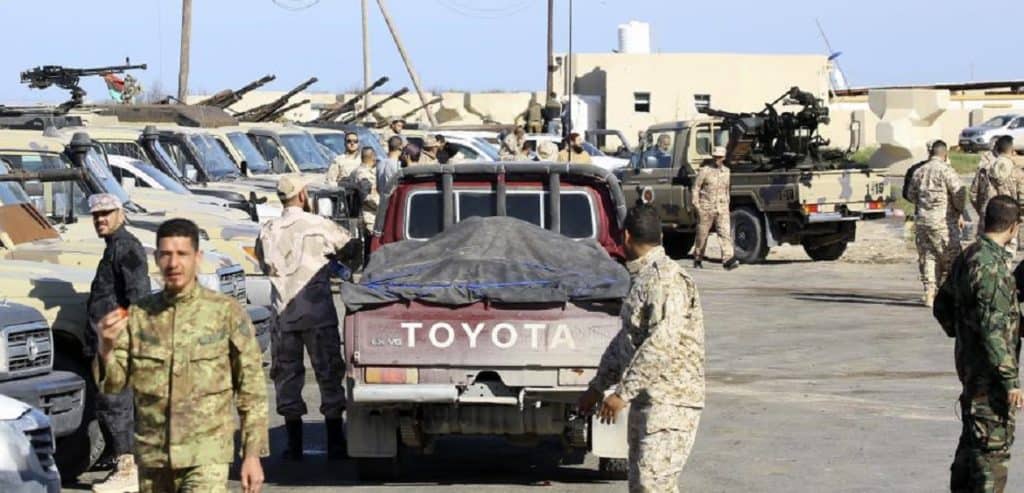By Denis Korkodinov
The conference was fully consistent with the “road map” consisting of 3 interconnected stages proposed by the UN ambassador to Libya, Gasam Salam: ceasefire, international conference and political settlement of the conflict.
However, the decision taken at the end of the Berlin Conference primarily reflects the positions of European countries and, to a lesser extent, takes into account the interests of the Libyan National Army. Also for this reason, the conference on Libya had a “zero” result.
The Berlin format of international dialogue was an unsuccessful attempt to influence the parties to the Libyan conflict, which were put in a tough choice: either they comply with the recommendations of European countries, including the provisions on the international arms embargo, or continue to fight each other.
Of course, such an ultimatum caused sharp criticism from the side of Khalifa Haftar and his entourage, who were virtually deprived of the opportunity to propose their own draft resolution to the existing crisis. And even the format of the 5 + 5 reconciliation committee, which began its work in Geneva, is unlikely to change the opinion of opponents of the Al-Vefak government, if only for the reason that the proposed dialogue format has been implemented outside of Libya.
In turn, the main success of the Berlin meeting is that German Chancellor Angela Merkel and UN Ambassador to Libya Gasam Salama managed, even formally, to bring together representatives of most regional players who support one or another side of the Libyan conflict.
This made it possible to formulate the positions, first of all, of Russia, France, Turkey, Egypt, the USA and other countries regarding the methods of political settlement of the confrontation between the forces of Khalifa Haftar and Fayez al-Sarraj.
Nevertheless, the positions of external force groups can hardly be considered unchanged, since the situation in Libya can change dramatically at any time. In addition, events in the Syrian province of Idlib, from where Turkey redirects its militants to protect the Government of National Accord, have a huge impact on the Libyan file.
In addition, it is worth noting that the conflict in Libya is not only a European problem. It is also a problem of the African continent and the Arab world. Therefore, in matters of its resolution it is necessary to take into account various aspects of geopolitics, which are not always identical to each other.
Meanwhile, the Berlin Conference proposed that the Libyan theater of operations be viewed only on one side, in terms of its conformity to European interests. In this regard, the political and economic aspects of the decision made during the conference were considered unrepresentatively.
In other words, the Berlin meeting was a rather weak attempt to determine the path to a political settlement of the Libyan crisis. The main reason for this is that the nature of this meeting did not imply taking into account the interests of the Libyan people themselves.
According to the UN ambassador to Libya, Gasam Salam, this decision was due to the responsibility of mainly European partners to the warring parties. This indicates that the fate of Libya is of interest to the UN exclusively in the context of European politics, on the basis of which, the opinion of the Libyan people, in this case, is of secondary importance to the international community.
Despite the fact that Khalifa Haftar and Fayez al-Sarraj were invited to Berlin at the request of Russian President Vladimir Putin, however, they did not directly participate in the conference and did not meet with each other. The meeting organizers acquainted them with the decisions made only after the conference was completed. For this reason, none of the parties to the conflict in Libya can boast that it has achieved success in the course of the organized negotiation process.
However, neither the Government of National Accord nor the Libyan National Army were interested in the Berlin meeting. In particular, Fayez al-Sarraj is extremely concerned that as a result of the launch of a political settlement mechanism, he will be removed from the post of head of official government of Tripoli.
In turn, Khalifa Haftar, despite her dependence on military supplies from Egypt, Russia and the United Arab Emirates, is still wary of giving international partners complete freedom of action in Libya. In addition, the commander of the Libyan National Army does not trust Russia, which during the Moscow Conference made it clear that it does not consider Khalifa Haftar as the only political figure in Libya capable of opposing the Government of National Accord. Moscow is also considering to strengthen the position of the son of the ousted leader of the Jamahiriya.
(The opinions expressed in this article are solely those of the author and do not necessarily reflect the views of World Geostrategic Insights)







